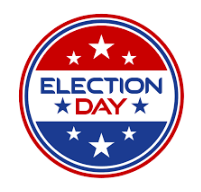Jucovy Palooza! : Ramaz Celebrates Election Day

A few weeks before election day, several club leaders – including, among others, the heads of Math Team, the Rampage, and Debate Team – received an email asking them to meet in 301 during their lunch period. When they arrived, however, they found that Dr. Jucovy had been double booked between his Age of Reagan class, which meets C8 to make up for lost class-time, and the scheduled appointment. A second meeting was called and held, followed by a third; over the course of these sessions, Dr. Jucovy informed the club leaders of his idea for the school’s special programming for the upcoming election day.
Presidential elections only occur every four years, but even in off, state and local elections can attract much attention, particularly in a politically active environment like Ramaz’s. Civic activism is an important value for the school, as demonstrated by the frequent fundraising drives coordinated for one charity or another and the school’s mission statement, which proclaims a commitment to the “democratic traditions and values” of the United States. In previous years, the school has brought in speakers and held assemblies to honor election day. At the end of each of these assemblies, the student body would vote on the candidates and ballot-box issues using clickers. Every year, however, there also seemed to be an issue: the speaker was out of touch, the students were unruly, someone’s feelings were offended, et cetera. Thus, this year, Dr. Jucovy, the chair of the history department, set about to make changes to the conventional program and create a more festive atmosphere.
This effort began with a redecoration campaign which covered the school in old election-day posters, ranging from McKinley to Roosevelt to Carter. There were also copious red, white, and blue decorations, such as ribbons, balloons, and a real-live Uncle Sam costume shared by students Hadley Kauvar ’19 and Harry Shams ’19. Early in the day, each grade had an assembly featuring a keynote speaker. Then, during each lunch period (6, 7, and 8), students had the opportunity to experience an “Election Day Club Fair.” The captains of clubs and teams with direct connections to the democratic process set up booths exploring their area of expertise in a manner all students could enjoy. For example, the Math Team had a display on polling data; Engineering Club discussed election hacking; Model UN set up a guess-the-flag activity; Mock Trial taught students how to gerrymander; Debate Team allowed students to face off on hot-button issues; the Rampage set up a Fake News quiz; Feminist Club ran a questionnaire comparing how male and female students would respond to the same queries; and Model Congress ran a competition to see who could guess the election results the most accurately in exchange for an $100 Amazon gift card.
“It was a fun way to get students interested and involved in the election and political issues,” said Abigail Jacobs ’19, who co-ran the Mock Trial booth. Zach Buller ’20, co-captain of Math Team, agreed that he had a “fun time running the booth,” but also acknowledged that the process leading up to the program had taken quite a bit of work. “When I was asked to run a booth for the Election Day assembly, I was confused by what that meant, or how math and elections could possibly be related. Dr. Jucovy suggested the great idea of talking about famous polling errors in American democratic history, which we then decided to enhance by also polling the students on various questions and compare the results between small and large sample sizes,” he said. Because the program was optional and ran parallel to students’ lunch periods, turnout was not nearly as high as it could have been. However, it was only the new program’s first year, and with modifications, it promises to become a fascinating new way for students to relate to America’s democratic process.


